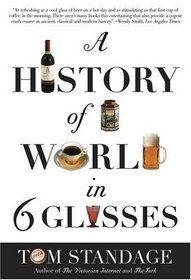Helpful Score: 1
Excellent review of history written through the lens of several of humanity's favorite beverages. Very enjoyable read.
Helpful Score: 1
Very intersting read, but a bit dry and dragging in places.
Helpful Score: 1
If you are a history buff, and even if you aren't, this is a wonderful read which adds more background as to why great movements in history and social change occurred or succeeded.
Now, when I lift that glass of beer to my lips, I feel proud, knowing I'm helping to preserve civilization!
Now, when I lift that glass of beer to my lips, I feel proud, knowing I'm helping to preserve civilization!
It's books like this that make history fun. An entertaining lesson in how six beverages (beer, wine, spirits, coffee, tea and Coca-Cola) had an impact on civilisation. As well as learning about these beverages, I also got a bit of a history lesson and learnt things that I didn't know before.
Interesting take on how the development, use, and trade in beer, wine, distilled spirits, coffee, tea, and cola drinks have impacted human history.
Standage casts a wide net here, looking at issues as disparate as health effects on drinkers and international trade policies, social status and the industrial revolution, and medical practice and Madison Avenue. Along the way, he serves up tasty aperitifs about an 870 BCE royal feast that lasted 10 days and provided wine to its 69,000 participants; one possible reason for Islam's prohibition of wine; and how to define "boiling" when referring to water for tea.
The final section of the book, which deals specifically with Coca-Cola, is probably the weakest part. While the background history of the development of the drink is fascinating, he doesn't even nod at how the sugar demands for soft drinks have impacted both international politics and public health. He instead takes a look at the Coke/Pepsi competition as Cold War weaponry -- an unexpected turn indeed.
When you finish this book, you may not only want to offer a toast to Standage, but you will also understand just what that gesture means. Salút!
Standage casts a wide net here, looking at issues as disparate as health effects on drinkers and international trade policies, social status and the industrial revolution, and medical practice and Madison Avenue. Along the way, he serves up tasty aperitifs about an 870 BCE royal feast that lasted 10 days and provided wine to its 69,000 participants; one possible reason for Islam's prohibition of wine; and how to define "boiling" when referring to water for tea.
The final section of the book, which deals specifically with Coca-Cola, is probably the weakest part. While the background history of the development of the drink is fascinating, he doesn't even nod at how the sugar demands for soft drinks have impacted both international politics and public health. He instead takes a look at the Coke/Pepsi competition as Cold War weaponry -- an unexpected turn indeed.
When you finish this book, you may not only want to offer a toast to Standage, but you will also understand just what that gesture means. Salút!
"A History of the World in 6 Glasses" is that an intriguing title or what? This was required reading for both of my daughters in their high school freshman literature class and it intrigued me for 4 years before I picked it up to read it. I had to get my own copy though because theirs was so heavily annotated (my understanding is that they are encouraged to write in their books these days - boy, how times have changed). Anyway . . .
In "A History of the World in 6 Glasses" Tom Standage presents a historical perspective on the development of the 6 major non-water beverages of the world as well as their subsequent impact on the evolution of the societies where they were developed. The six, in a rough chronological order, are beer, wine, spirits, coffee, tea, and Coca-Cola.
Mr. Standage's writing still is light and easy to read yet full of information. There some tidbits I vaguely recall from my school years (such as the rise of sugar cane and production of molasses) but many new facts that I found fun and informative - like the alcohol limit inherent in beer production, and how beer and wine effected the outcome of various naval battles.
Definitely worth a read if you are a history buff, enjoy reading about the evolution of cultures, or simply like beer, wine, and spirits - or coffee, tea - or Coke. Salud!
In "A History of the World in 6 Glasses" Tom Standage presents a historical perspective on the development of the 6 major non-water beverages of the world as well as their subsequent impact on the evolution of the societies where they were developed. The six, in a rough chronological order, are beer, wine, spirits, coffee, tea, and Coca-Cola.
Mr. Standage's writing still is light and easy to read yet full of information. There some tidbits I vaguely recall from my school years (such as the rise of sugar cane and production of molasses) but many new facts that I found fun and informative - like the alcohol limit inherent in beer production, and how beer and wine effected the outcome of various naval battles.
Definitely worth a read if you are a history buff, enjoy reading about the evolution of cultures, or simply like beer, wine, and spirits - or coffee, tea - or Coke. Salud!




![header=[] body=[Get a free book credit right now by joining the club and listing 5 books you have and are willing to share with other members!] Help icon](/images/question.gif?v=fef97fda)
